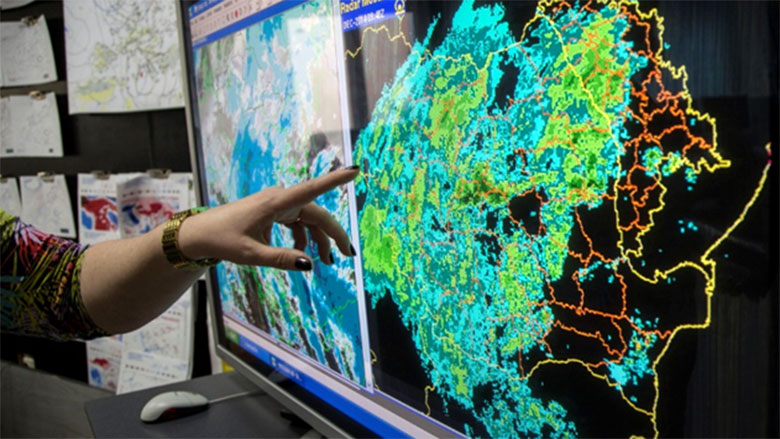
As ‘weather on steroids’ becomes the new normal in California – from bomb cyclones and atmospheric rivers to more severe fire seasons and longer droughts – a California Institute of Technology researcher is on a mission to help the public prepare by predicting rare weather patterns. And he’s combining math and genetics to do it.
“There’s a lot of climate uncertainty right now and we want to pin down exactly where these rare events can hit and how frequently we can expect them to hit, so that disaster preparedness resources can be diverted to those cities and areas most at risk,” said Robert Webber, a postdoctoral scholar in the Department of Computing and Mathematical Sciences. His first-of-its-kind genetics algorithm for rare weather prediction is showing promising preliminary results.
Webber’s research, which is featured in SIAM News, is based on a genetic algorithm that’s most often used in the fields of biochemistry and finance to solve complex medical challenges or predict rare events like a catastrophic stock market collapse. Webber’s work adapts these techniques to analyze geophysical situations instead.
Currently, he’s focusing on predicting the likelihood that a category five hurricane will hit a major city. However, it can be applied to any weather event for which weather simulation models already exist, including floods, heat waves, wildfires, and extreme cold temperatures caused by the polar vortex. It is the first genetic algorithm – a high-level math procedure inspired by the process of natural selection – to deliver accurate weather predictions by using smaller sample sizes and fewer computing resources.
A self-described ‘outdoorsy guy,’ Webber was frustrated by conflicting stories about the impact of climate change and decided to apply his mathematical modelling skills to the problem. His goal is to help the population better prepare for the future by offering more accurate predictions about what’s likely or unlikely to occur; given the success of his current work, he expects genetic algorithms to emerge as the mainstream approach for forecasting extreme weather event probabilities within the next decade.
“I want to see to what extent we can pin down precise estimates for different climate change scenarios,” Webber said. “Climate change is scary and no one knows what the future holds. But as scientists, we can offer precise evidence to show that if we continue to emit carbon into the air at current levels, then this is what we will see in terms of category five hurricanes or other rare weather events in the next 20 years.”
Webber explained that his rare event sampling technique delivers very good results with 100 or 1,000 sample simulations. Other predictive models need upwards of 10,000 samples to be effective, which makes them costly and time-consuming to run. “We’re able to perform large calculations that were previously inaccessible,” he said. “That means we can dare to attack problems that other researchers wouldn’t.”
His algorithm can make more accurate predictions because it borrows from Charles Darwin’s ‘survival of the fittest’ concept, wherein organisms that are better adapted to their environment are most likely to survive and reproduce. In Webber’s case, an organism is a weather simulation and the ‘fittest’ events are those that more closely align to the rare weather in question.
For example, if the algorithm is modeling the likelihood of the next heat wave, weather simulations that indicate high heat over a long period of time would be replicated and run in parallel to create a fitter sample. “We take a simulation and produce many different copies, randomly selecting fewer of the models that aren’t forecasting extreme weather and keeping more of the ones that are,” Webber explained. “By randomly ‘killing’ the simulations that show a low weather risk assessment, we’re able to use less computing power but still get estimates that are statistically correct in the end. We can tell you what the chances are of a hurricane hitting and whether it’s going to have a category four or five status.”
Similarly, researchers could utilize the algorithm to model the likelihood and geographic distribution of another severe wet winter in California over the next 10 years in order to prepare for the prospect of future catastrophic landslides. It can also be used to run different climate change scenarios that reveal the impact of a one-degree Celsius change versus a four-degree Celsius change on weather events, for example.
Despite the early success of Webber’s model, one rare weather occurrence that remains elusive to all climate change researchers, however, is the earthquake. Unlike other weather events that follow a pattern and can therefore be forecasted with a degree of certainty, there is no clear way to model the mashing and colliding of tectonic plates that eventually lead to a quake.
“No matter how many we see or how long we wait between earthquakes, we’re not able to make a better guess, so they remain mysterious,” Webber said.
About Society for Industrial and Applied Mathematics (www.siam.org)
Society for Industrial and Applied Mathematics (SIAM), headquartered in Philadelphia, Pennsylvania, is an international society of more than 14,000 individual, academic and corporate members from 85 countries. SIAM helps build cooperation between mathematics and the worlds of science and technology to solve real-world problems through publications, conferences, and communities like chapters, sections and activity groups. Learn more at siam.org.
In the modern speedy-paced, era-driven world, the landscape of education is constantly evolving. Australian universities…
Investors seeking diversification and attractive returns are turning to private alternative investments. These non-traditional investment…
As young couples plan their wedding, they are filled with joy and hopes for a…
A business tax attorney is a legal professional who specializes in helping businesses navigate complex…
Located in the city of Hyderabad, the Falaknuma Palace is one of the most famous…
Off-roading has exploded in popularity, transforming from a rugged pastime into a mainstream recreational activity.…